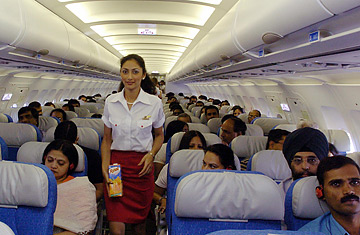
A flight attendant walks the cabin of a Kingfisher Airlines jet.
Customer satisfaction forms, suggestion boxes and service surveys are more ubiquitous in India than anywhere else I've been. In hotels, at restaurants, on flights, Indian companies seem obsessed with tracking what you think of them and how they might improve. Don't get me wrong, I love filling in those little circles (Excellent, Good, Average, Poor) and am even what you might call a service obsessive: On occasion I'll go so far as to add in my own categories if I think the grades offered are too limiting — what else can you do if the service was better than "average" but not quite "good." But India's love affair with customer feedback may be too much even for me.
Order a pizza? You'll get a call back later to see how it was. Eat out? You'll be asked to fill in a form rating everything from the friendliness of the staff to the selection of drinks. And I'm not just talking about American-style fast food joints. At the end of a meal at one of New Delhi's toniest restaurants last week the bill came accompanied by a feedback form — rate the "ambience and dcor," the "value of meal" — that the waiter urged me to fill out, sounding an off note at the end of a pleasant evening. And what to make of the little card asking me to "Tell Us What You Think" that dropped out of a free 2007 calendar that I received at my office a couple weeks ago. Should I complete the form now, or in a year?
Curious about the reason for this obsession with feedback, I rang a couple of experts. Murali Swamy, the Bangalore-based head of research and consulting at research firm Gallup India reckons it has to do with the fact that free enterprise is relatively new in India, and that only in the past decade or so have firms been forced to begin thinking about their customer. In the old days, companies "used to have people queued up outside their offices to whom they would dole out their products depending on favoritism and availability. Now it's a market of supply and there's a lot more competition, so businesses have to be much more customer-focused." Sridevi Rao, an associate vice president at the research firm IMRB International in Mumbai, agrees. As new retail, telecom, credit card and airline businesses slug it out in the booming Indian market, she says, "players in these sectors are still in the process of standardizing service delivery while at the same time having to put up with strong competition from multiple service providers. In such a scenario it is inevitable that feedback is crucial to benchmark and improve service standards."
Interestingly, Swamy also believes India's role as the world's back office over the past few years has hammered home the idea that the world's best companies are customer focused. Employees at firms processing customer feedback forms from Europe or taking calls for companies based in the U.S., for instance, take the concept that customer is king with them when they start their own businesses.
Which got me to thinking: what about a customer feedback form in which ordinary Indians could rate their government on a series of questions? After all, the government is the provider of such crucial services as education and health. Imagine a form asking whether Indians were happy that dengue fever killed only dozens of people in Delhi last year rather than hundreds? Whether the regular power outages in their neighborhood were Fair, Annoying or Criminal? Or whether the health facilities in their local hospital were Good, Poor or Life Endangering? Then it occurred to me that the government already gets pretty good feedback every few years. It's called an election.
